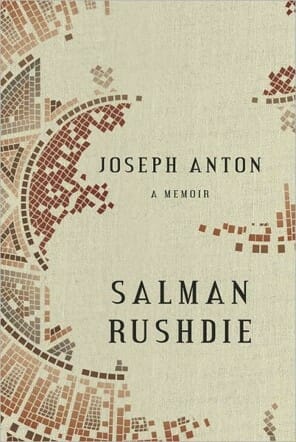Joseph Anton: A Memoir by Salman Rushdie
Man on the run

At one point in the British film My Son the Fanatic, scripted by Hanif Kureishi and based on his short story, a white comedian performing in the 1990s in a club in the northern English town of Bradford begins referring to the sole non-white member of the audience (played by Indian actor Om Puri) as “Salman Rushdie.”
Between crude as well as racist taunts, the comic makes a terrifying statement regarding his hapless and unwilling Rushdie dummy: “If there’s any of [Iranian President Hashemi] Rafsanjani’s mates in here, slip me a tenner and I’ll shoot the bastard for ya.”
Such a remark, even if made jokingly, exemplifies the hostility Rushdie endured from many fellow Britons following the 1988 publication of his novel The Satanic Verses. That work incited Ayatollah Ruhollah Khomeini, the founder and supreme leader of the Islamic Republic of Iran, to issue a 1989 fatwa, or legal ruling, calling on faithful Muslims to murder the author for blasphemy.
“Polls taken after the ‘Rushdie Affair’ began,” writes Rushdie in his new memoir Joseph Anton, in which he refers to himself in the third person, “showed that a large majority of the British public felt he should apologize for his ‘offensive’ book.”
Joseph Anton derives its title from the names of Joseph Conrad and Anton Chekhov, two of Rushdie’s favorite writers. (Rushdie may like the writers, but he did not want to become someone else; he refers to himself in the third person apparently to emphasize his discomfort with his new moniker.) “Joseph Anton” became the name Rushdie used for everything but writing during the decade he spent in hiding and under police protection. “His own name was worse than useless,” he recalls. “[I]t was a name that could not be spoken, like the name Voldemort in the then-unwritten Harry Potter books.”
Rushdie, who moved to Britain from his native India at the age of 13, expresses profound gratitude to those Britons who stood by him throughout his ordeal. These include family, friends, several fellow writers and public figures, the anti-censorship organization “Article 19,” the police officers who guarded him and ordinary decent folk. (He also thanks his supporters around the world, including several Arabs and Muslims, and repeatedly writes of his sorrow regarding the deaths of demonstrators protesting his book in the Indian subcontinent, the murder of his Japanese translator and the wounding of his Italian translator and Norwegian publisher.)
Without question, however, the open contempt many Britons exhibited toward him, unconcerned as they were for the plight of a British citizen of Indian origin, turned him off the country. Rushdie moved to the United States in the early 2000s—once the fatwa had all but receded into oblivion—where he has remained.
Rushdie’s relationship with another country, his native India, features even more prominently in Joseph Anton, and proves fascinating.
“He was a writer for whom India had been the deepest wellspring of his inspiration.” But India became the first country to ban The Satanic Verses. Worse, India refused to issue Rushdie a visa for more than a decade. (The writer likely lost his Indian citizenship when he became a citizen of the United Kingdom, as India prohibited dual nationality until recently.) That Rushdie continued plunging successfully into that wellspring for novels such as Haroun and the Sea of Stories (a children’s book written for his first son) and The Moor’s Last Sigh attests to the mixture of vivid imagination and resilient memory animating his work: “He thought of [Somali novelist] Nuruddin Farah carrying Somalia in his heart wherever he traveled, and was proud that he had managed to write [The Moor’s Last Sigh] from the private India he carried everywhere with him.”
It is advisable to take Rushdie’s “Offensive, moi?” protestations regarding The Satanic Verses with a grain of salt, especially as he allows, every so often, that he meant for the novel to challenge (if not undermine) conventional notions of religion and revelation.
Rushdie recounts an experience shortly before the publication of the novel, when he was a guest on a British radio program in which interviewees list eight songs or pieces of music they would want to have with them if stranded on a desert island. Somewhat mischievously, Rushdie notes, “[One] of his choices was, perhaps, the music playing beneath the text of his new novel: ‘Sympathy for the Devil,’ by the Rolling Stones.”
-

-

-

-

-

-

-

-

-

-

-

-

-

-

-

-

-

-

-

-

-

-

-

-

-

-

-

-

-

-

-

-

-

-

-

-

-

-

-

-








































